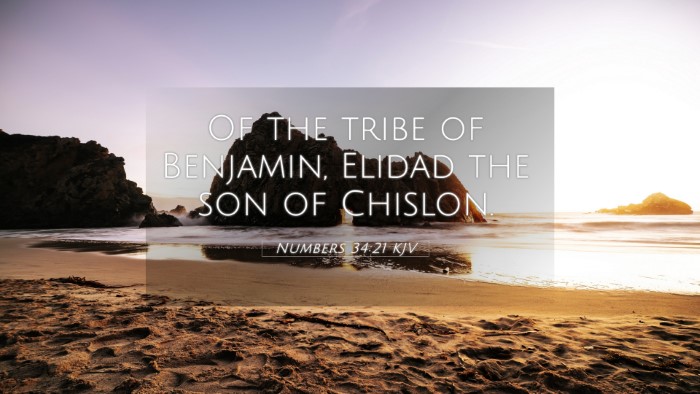Understanding Numbers 34:21
The verse Numbers 34:21 states: "Of the tribe of Benjamin, Elidad the son of Kislon." This verse is part of the instructions given to Moses regarding the allocation of the Promised Land among the tribes of Israel, specifically mentioning the tribe of Benjamin and its representative.
Meaning and Context
This verse signifies the importance of each tribe's representation and the systematic approach God took in distributing the land. Commentators like Matthew Henry emphasize the orderliness of God's plan, showing a contrast to chaotic human judgment.
Albert Barnes highlights that this mention of individuals from each tribe showcases the personal responsibility and participation of each tribe in God's promises.
Adam Clarke adds that the names and lineages reflect the true fulfillment of God’s promise to Abraham, Isaac, and Jacob regarding the land of Canaan.
Significance of the Tribe of Benjamin
Benjamin holds a significant place in Scripture. The tribe's territory included key cities, and it is notable for producing important Biblical figures, including King Saul and the Apostle Paul. The representation of Benjamin in Numbers 34:21 is a reminder of God's faithfulness to preserve a remnant from each tribe.
Bible Verse Cross-References
- Joshua 18:11 - Details the distribution of land to the tribe of Benjamin.
- Genesis 49:27 - Jacob's blessing shapes the character and future of the tribe of Benjamin.
- 1 Chronicles 5:2 - References Benjamin's prominence among the tribes of Israel.
- Romans 11:1 - Paul addresses his Jewish lineage, specifically mentioning his descent from Benjamin.
- Judges 20:18 - The tribe of Benjamin is mentioned in a narrative involving a civil conflict in Israel.
- Isaiah 11:12 - God's promise to gather the remnant of the tribe of Benjamin in the future.
- Philippians 3:5 - Paul lists his Hebrew heritage, proud of being from the tribe of Benjamin.
Thematic Connections
Numbers 34:21 connects thematically to other verses where tribes are allocated their places in the Promised Land. It invites a comparative Bible verse analysis, particularly regarding the Lord's covenantal faithfulness and the historical significance of the tribes of Israel.
Linking Bible scriptures from the Old Testament to the New Testament can further underline the promises concerning these tribes, especially in terms of their ultimate fulfillment in Christ.
Cross-Referencing Bible Study Tools
To delve deeper into scriptural cross-referencing, readers can utilize tools like a Bible concordance or a cross-reference Bible study guide. These resources will assist in identifying connections between various verses that relate to specific themes, such as covenant, land, and identity in Christ.
Methods of cross-referencing can help in understanding how Old Testament themes resonate in the New Testament, particularly highlighting the continuity of God's redemptive plan.
Exploring Cross-References Further
By examining the relationships between Verses like Genesis 12:7 and Matthew 2:1-6, one can see the unfolding of God’s promise concerning land and the leadership that arose from the tribes of Israel.
This promotes deeper insight into identifying connections between Old and New Testament themes that enrich one's understanding of God's word.
User Intent for Cross-Referencing
Individuals seeking to answer questions like "What verses are related to Numbers 34:21?" or "How do Numbers 34:21 and Joshua 18:11 connect?" will find that exploring these cross-references strengthens the understanding of the Biblical narrative and enhances personal Bible study.
Conclusion
In summary, Numbers 34:21 illustrates the structured method by which God distributed the Promised Land among the tribes of Israel, with the tribe of Benjamin receiving recognition through its representative, Elidad. Through various public domain commentaries, the verse reveals deeper insights into God's faithfulness and the significance of tribal identities in the overarching biblical narrative. The verse connects to numerous related texts, enriching the understanding of the Scriptures through effective cross-referencing and comparative study.




